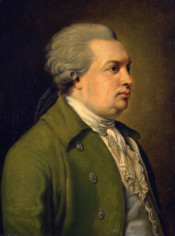
From the Presidential Library collections: "Laughter is a good weapon against stupidity and ignorance, which Fonvizin possessed perfectly"
April 14, 2018 marks the 273rd anniversary of the birth of the classic of Russian literature of the XVIII century, Denis Ivanovich Fonvizin. The electronic collections of the Presidential Library include both the "Complete Collection of Original Works" of the satirist, published in 1902, and studies devoted to his life and work.
"Laughter is a good weapon against stupidity and ignorance, which Fonvizin possessed perfectly", - writes the author, who took refuge behind the initials of K. P. M. in the rare edition “Denis Ivanovich Fonvizin” (1900), presented on the portal of the Presidential Library. - It must be remembered "The Minor" depicts mores of a part of Russian society of the middle of the eighteenth century. With the ignorance of the small landlords of that time, the government had to fight very hard. The government made every effort to explain the benefits of education, both individuals and the entire state. Very few, however, understood this".
Like many immigrants from Germany who became real patriots of Russia, representatives of the Fon-Wiesen family eventually began to write their names not in German order rather than in Russian, Fonvizins. The education received by the future writer in the family, and then at the Moscow university gymnasium, allowed him undergoing a three-year university degree course and enter military service, and then work as an interpreter in a foreign collegium. From this moment the Petersburg period of his life begins.
An educated, easy-going young man was loved in society; always there were influential patrons, ready to promote him on a career ladder, to create conditions for literary work. At first it was Cabinet-Minister Yelagin, an inveterate theater-goer, trying to save the beginning writer from an onerous ministerial routine. With his patronage Fonvizin managed to write and read in the presence of the Empress himself the comedy "The Brigadier", in which he ridiculed the worship of everything foreign "without distinction, whether this foreign is good or useful, or is no good".
The favor of Nikita Ivanovich Panin, who was the tutor of Pavel Petrovich, who was in charge of foreign affairs, also contributed to the young writer's energetic activity, "fully revealing his talents". "Count Panin", - we read in the above-mentioned book, "was an outstanding man among the companions of Empress Catherine, distinguished by intelligence, activity and brilliant abilities. Flatterers and seekers were disgusted".
After the cesarevitch's education, Panin received a generous reward from the Empress in the form of an estate with nine thousand souls of peasants - and with all his heartfelt generosity gave out the royal gift to his best colleagues. About a thousand two hundred serfs came to the share of Denis Ivanovich. Henceforth he became not just a wealthy person - a rich man. In a word, Fonvizin did not have to complain about life. "Yes, complaining and falling down at all was not in his character, extremely lively, carefree and cheerful", - according to the book "Denis Ivanovich Fonvizin". - Fonvizin was met everywhere with open arms, everywhere he was a welcome guest. Everyone recognized him as an intelligent, outstanding man and a talented writer. To the extremely attractive features of Denis Ivanovich was still responsiveness".
In 1782 in the theater of the merchant Karl Knipper in the Tsaritsyn Meadow (now the Field of Mars) a triumphant performance of the play "The Minor" took place. "The audience "applauded this play by throwing purses with money "on the stage", - a short biographical sketch in the book "Works of D. I. Fonvizin" testifies. Very soon, the comedy moved to the stage of the imperial theaters.
"One of Fonvizin's acquaintances", - says the same author, K. P. M., - told him after the performance: "Die, Denis, - you cannot compose better". These words turned out to be prophetic. Indeed, after this play Fonvizin wrote a little - and there was nothing equal to "The Minor".
In the electronic reading room of the Presidential Library one can get familiar with A. Nezelenov's study "Literary trends in the Catherine's epoch" (1889). The author of the well-known historian of literature in the XIX century Professor Alexander Ilyich Nezelenov made some deep remarks about the character of Fonvizin's talent and the typical character of the heroes of "The Minor". The comic of the presented on the stage, in the opinion of the critic, is not only that the life of the family of the Prostakov family and the hopeless backwardness of Mitrofanushka are written out rudely, colorfully, with knowledge of business. In the "The Minor" there is an underlying comic, deeper, inner: rudeness, which tries to look kindly; greed, covered by imaginary magnanimity; ignorance, which claims to be educated.
Perhaps because of this, Fonvizin's comedy has been on the stage for almost a century and a half: "an incompatible connector", "a mirror of vices and virtues that come into dispute with them". This is the most relevant play, which is always lacking the theater of search of all times and peoples.

